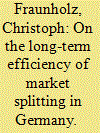| Srl | Item |
| 1 |
ID:
177321


|
|
|
|
|
| Summary/Abstract |
In Europe, the ongoing renewable expansion and delays in the planned grid extension have intensified the discussion about an adequate electricity market design. Against this background, we jointly apply an agent-based electricity market model and an optimal power flow model to investigate the long-term impacts of splitting the German market area into two price zones. Our approach allows capturing long-term investment and short-term market behavior under imperfect information. We find strong impacts of a German market splitting on electricity prices, expansion planning of generators and required congestion management. While the congestion volumes decrease significantly under a market split in the short term, the optimal zonal configuration for 2020 becomes outdated over time due to dynamic effects like grid extension, renewable expansion and new power plant investments. Policymakers and regulators should therefore regularly re-assess bidding zone configurations. Yet, this stands in contrast to the major objective of price zones to create stable locational investment incentives.
|
|
|
|
|
|
|
|
|
|
|
|
|
|
|
|
| 2 |
ID:
177336


|
|
|
|
|
| Summary/Abstract |
In electricity markets around the world, the substantial increase of intermittent renewable electricity generation has intensified concerns about generation adequacy, ultimately driving the implementation of capacity remuneration mechanisms. Although formally technology-neutral, substantial barriers often exist in these mechanisms for non-conventional capacity such as electricity storage. In this article, we provide a rigorous theoretical discussion on design parameters and show that the concrete design of a capacity remuneration mechanism always creates a bias towards one technology or the other. In particular, we can identify the bundling of capacity auctions with call options and the definition of the storage capacity credit as essential drivers affecting the future technology mix as well as generation adequacy. In order to illustrate and confirm our theoretical findings, we apply an agent-based electricity market model and run a number of simulations. Our results show that electricity storage has a capacity value and should therefore be allowed to participate in any capacity remuneration mechanism. Moreover, we find the implementation of a capacity remuneration mechanism with call options and a strike price to increase the competitiveness of storages against conventional power plants. However, determining the amount of firm capacity an electricity storage unit can provide remains a challenging task.
|
|
|
|
|
|
|
|
|
|
|
|
|
|
|
|